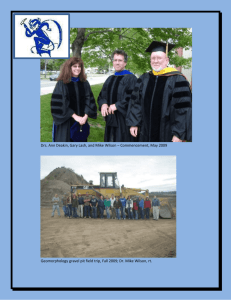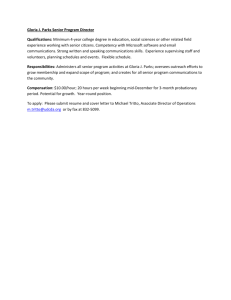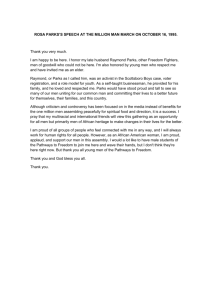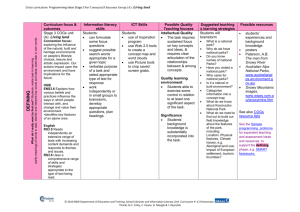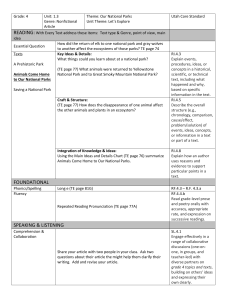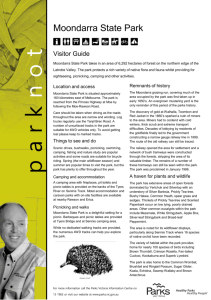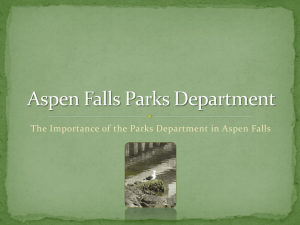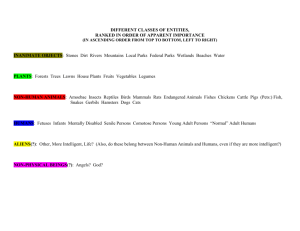What makes a national park
advertisement
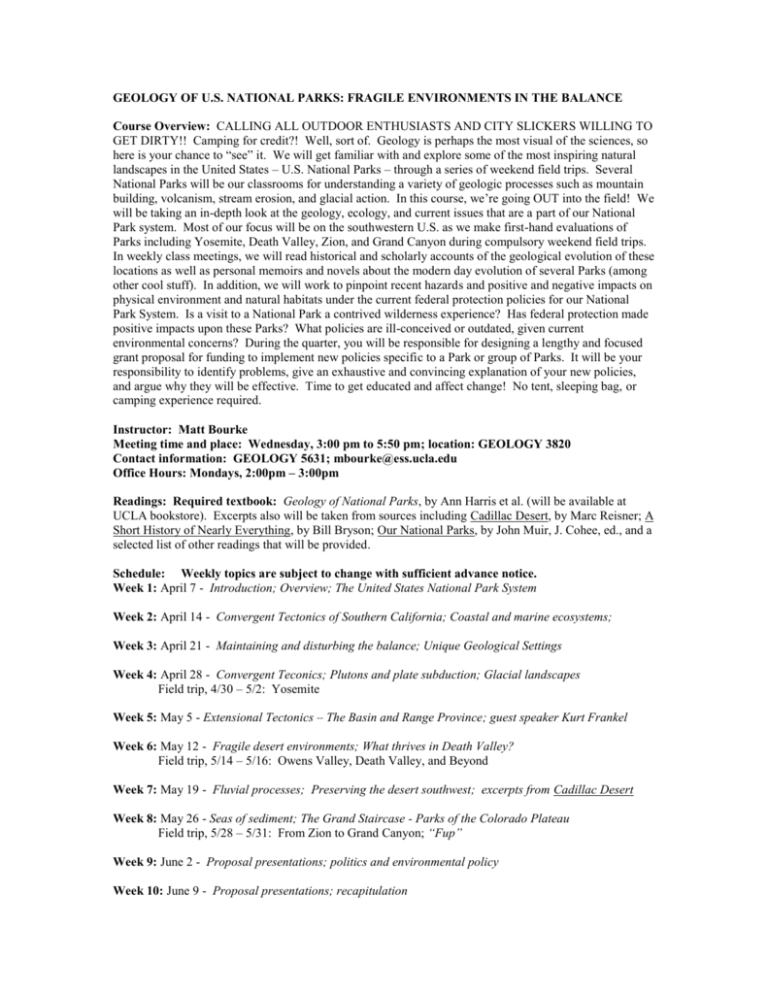
GEOLOGY OF U.S. NATIONAL PARKS: FRAGILE ENVIRONMENTS IN THE BALANCE Course Overview: CALLING ALL OUTDOOR ENTHUSIASTS AND CITY SLICKERS WILLING TO GET DIRTY!! Camping for credit?! Well, sort of. Geology is perhaps the most visual of the sciences, so here is your chance to “see” it. We will get familiar with and explore some of the most inspiring natural landscapes in the United States – U.S. National Parks – through a series of weekend field trips. Several National Parks will be our classrooms for understanding a variety of geologic processes such as mountain building, volcanism, stream erosion, and glacial action. In this course, we’re going OUT into the field! We will be taking an in-depth look at the geology, ecology, and current issues that are a part of our National Park system. Most of our focus will be on the southwestern U.S. as we make first-hand evaluations of Parks including Yosemite, Death Valley, Zion, and Grand Canyon during compulsory weekend field trips. In weekly class meetings, we will read historical and scholarly accounts of the geological evolution of these locations as well as personal memoirs and novels about the modern day evolution of several Parks (among other cool stuff). In addition, we will work to pinpoint recent hazards and positive and negative impacts on physical environment and natural habitats under the current federal protection policies for our National Park System. Is a visit to a National Park a contrived wilderness experience? Has federal protection made positive impacts upon these Parks? What policies are ill-conceived or outdated, given current environmental concerns? During the quarter, you will be responsible for designing a lengthy and focused grant proposal for funding to implement new policies specific to a Park or group of Parks. It will be your responsibility to identify problems, give an exhaustive and convincing explanation of your new policies, and argue why they will be effective. Time to get educated and affect change! No tent, sleeping bag, or camping experience required. Instructor: Matt Bourke Meeting time and place: Wednesday, 3:00 pm to 5:50 pm; location: GEOLOGY 3820 Contact information: GEOLOGY 5631; mbourke@ess.ucla.edu Office Hours: Mondays, 2:00pm – 3:00pm Readings: Required textbook: Geology of National Parks, by Ann Harris et al. (will be available at UCLA bookstore). Excerpts also will be taken from sources including Cadillac Desert, by Marc Reisner; A Short History of Nearly Everything, by Bill Bryson; Our National Parks, by John Muir, J. Cohee, ed., and a selected list of other readings that will be provided. Schedule: Weekly topics are subject to change with sufficient advance notice. Week 1: April 7 - Introduction; Overview; The United States National Park System Week 2: April 14 - Convergent Tectonics of Southern California; Coastal and marine ecosystems; Week 3: April 21 - Maintaining and disturbing the balance; Unique Geological Settings Week 4: April 28 - Convergent Teconics; Plutons and plate subduction; Glacial landscapes Field trip, 4/30 – 5/2: Yosemite Week 5: May 5 - Extensional Tectonics – The Basin and Range Province; guest speaker Kurt Frankel Week 6: May 12 - Fragile desert environments; What thrives in Death Valley? Field trip, 5/14 – 5/16: Owens Valley, Death Valley, and Beyond Week 7: May 19 - Fluvial processes; Preserving the desert southwest; excerpts from Cadillac Desert Week 8: May 26 - Seas of sediment; The Grand Staircase - Parks of the Colorado Plateau Field trip, 5/28 – 5/31: From Zion to Grand Canyon; “Fup” Week 9: June 2 - Proposal presentations; politics and environmental policy Week 10: June 9 - Proposal presentations; recapitulation Requirements: Participation, attendance, participation, at least one weekend field trip (but you may attend all of them!), participation, a field journal written during one of the field trips you attend*, weekly assignments and reading, discussion leadership, grant proposal, proposal presentation. For each field trip, transportation, camping fees, and possibly rental sleeping bags and tents will be covered by the class. Each student will be responsible for paying for his/her own food, supplies, and extras purchased while we are away from LA. Anticipate budgeting about $15 per day, maximum. * NOTE: Field journal will be creative, critical, and descriptive and must be written during a field trip to be handed in during the following week’s meeting. Participation: You must participate enthusiastically and with relevance to the topic at hand. This seminar cannot work without your participation! This course is for students who want to get outside, go camping, and understand the natural world around them! Your grade will weigh heavily on your active involvement in the course (attendance, effort, assignments, discussion participation), so get excited to be here!! (Can you tell I’m already excited?) Discussion Leadership: Each week, small groups of students will be called upon to host a portion of the discussion on the topic at hand. The presentations will stem from a small list of readings that I will provide for you. Each group member will be asked to make a short presentation on the relevant material and subsequently lead a scholarly discussion on that topic. These presentations will lead into a short period of formal debate that the presenters will mediate. Formal Grant Proposal: In a group of three, design a proposal, complete with references, figures, and itemized budget, for funding to restore and/or preserve one aspect that is unique to a particular National Park or group of Parks. Create an argument fitting the needs specific to that park and detail why your proposal provides necessary protection of the ecosystem and/or physical landscape. Each group member will be responsible for creatively formulating the backbone of the proposal, an exhaustive explanation, based in scientific evidence, pertaining to why the preservation must take place, how it will be accomplished, and the projected environmental impact analysis. A formal grant proposal application will be supplied to each group. You must design a creative presentation of your proposal to be presented to the Grant Committee (the rest of the class) during one of the last two seminar meetings. Sell it to us, baby! Weekly Assignments: 30-100 pages of reading, intermittent writing assignments, presentation preparation Typical weekly format (subject to variability): 1) Student-lead group discussion – 20-30 min. 2) Matt’s presentation – 30 min. 3) Recess – 10 min. 4) focused discussion of readings and presentation material – 50 min. 5) in-class writing assignment – 15 min. 6) interactive exercises of various sorts – 20-30 min. Grade Breakdown: Participation: -field trip (+presentation): -instructor grade: Discussion Leadership: Field Journal: Weekly Assignments: Grant Proposal: 40% 15% 25% 10% 15% 15% 20% 100%
